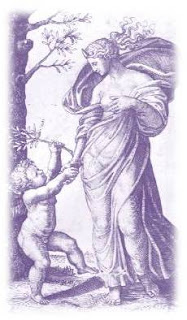Conferentie Emotional Minds / Die Emotionalität des Geistes
Van 14 t/m 16 oktober 2010 is er in München een driedaagse conferentie (Tagung) over: Passions and the Limits of Pure Inquiry II: The Seventeenth Century.

 Dr. Sabrina Ebbersmeyer (1967) en Wissenschaftliche Hilfskraft Kathrin Schlierkamp M.A. van het Seminar für Geistesgeschichte und Philosophie der Renaissance, een instituut van de Fakultät für Philosophie, Wissenschaftstheorie und Religionswissenschaft van de Ludwig Maximilians Universität München, zijn de organisatoren.
Dr. Sabrina Ebbersmeyer (1967) en Wissenschaftliche Hilfskraft Kathrin Schlierkamp M.A. van het Seminar für Geistesgeschichte und Philosophie der Renaissance, een instituut van de Fakultät für Philosophie, Wissenschaftstheorie und Religionswissenschaft van de Ludwig Maximilians Universität München, zijn de organisatoren.
 "The aim of this conference is to revaluate the contributions of seventeenth century philosopher to the understanding of the emotional side of the mind by examining the relationship and the boundaries between the passions and reason and by focusing on the affective elements in cognition. Which models of mind and emotions were developed in this period? How did these models differ from previous ones? Did the new ones manage to overcome the epistemological crises inherited by the Renaissance, when the power of reason over the passions was disputed?"
"The aim of this conference is to revaluate the contributions of seventeenth century philosopher to the understanding of the emotional side of the mind by examining the relationship and the boundaries between the passions and reason and by focusing on the affective elements in cognition. Which models of mind and emotions were developed in this period? How did these models differ from previous ones? Did the new ones manage to overcome the epistemological crises inherited by the Renaissance, when the power of reason over the passions was disputed?"
Op dit blog wil ik niet alle conferentie signaleren, alleen die waarbij veel aandacht aan Spinoza wordt gegeven. Dat is hier het geval. De tweede dag worden zes lezingen over Spinoza’s filosofie gegeven.
De eerste dag (14 okt.) staat in het teken van Descartes (The impact of Descartes’s theory of the passions). Daarbij zullen o.a. spreken Amelie Oksenberg Rorty (Boston University): The Functional Logic of Cartesian Passions; en Theo Verbeek (University of Utrecht): Cartesianische Generosität: Erkenntnis oder Leidenschaft?
De tweede dag (15 okt.) staat Spinoza centraal: Exploring Spinoza’s theory of the affects11.00-11.45 - Wolfgang Bartuschat (Universität Hamburg): Spinoza über Vernunft und Affektivität
11.45-12.30 - Lilli Alanen (University of Uppsala): Explaining (away) the affects: Spinoza and the Science of the Human Mind14.30-15.15 - Susan James (Birkbeck, London): Sameness and difference in reason and imagination
15.15-16.00 - Denis Kambouchner (Université de Paris 1): Spinoza and the problem of ‘Abjectio’ 16.30-17.15 - Lisa Shapiro (Simon Fraser, Burnaby): Imagination and Affect in Spinoza17.15-18.00 - Ursula Renz (Universität Klagenfurt): Die eigenen Gefühle verändern. Zum Verhältnis von aposteriorischer Selbsterkenntnis und Emotionen bei Spinoza und Shaftesbury
- - -
Feeling and thinking are different modes of the mind regarded generally as opposed to each other, at least in the dominant traditions of Western philosophical thought. Whereas our cognitive powers are considered as efficient instruments to pursue and realize our intentions and undertakings, emotions clouding our intellectual capacities seem to render understanding difficult. Although some emotions may be helpful for practical purposes, as Descartes already claimed, they are hardly of any use for seeking the truth.According to standard accounts this view originated from, or at least prevailed with, rational philosophy of the seventeenth century. It was then, that a new and narrow concept of rationality was established and fixed, excluding and suppressing those elements of cognition related to the emotional and irrational side of our understanding.
But the age of reason was at the same time the age of passion: not only Hobbes, but also Descartes, Spinoza, Pascal and Leibniz devote considerable attention to the subject. Recent investigations have shown impressively the various and complex ways in which philosopher of the seventeenth century exerted themselves to explain the affective nature of the mind. In addition, a large number of treatises about the passions were written in this period (e.g. by Senault, Coëffeteau and Cureau de la Chambre) while women philosopher entering the philosophical discourse argued for recognition of the emotional nature of the human mind (e.g. Elisabeth of Bohemia or Anne Conway).
 Locatie conferentie:
Locatie conferentie:
Center for Advanced Studies
Ludwig-Maximilians-Universität München
Seestraße 13
80802 München
Zie flyer PDF

